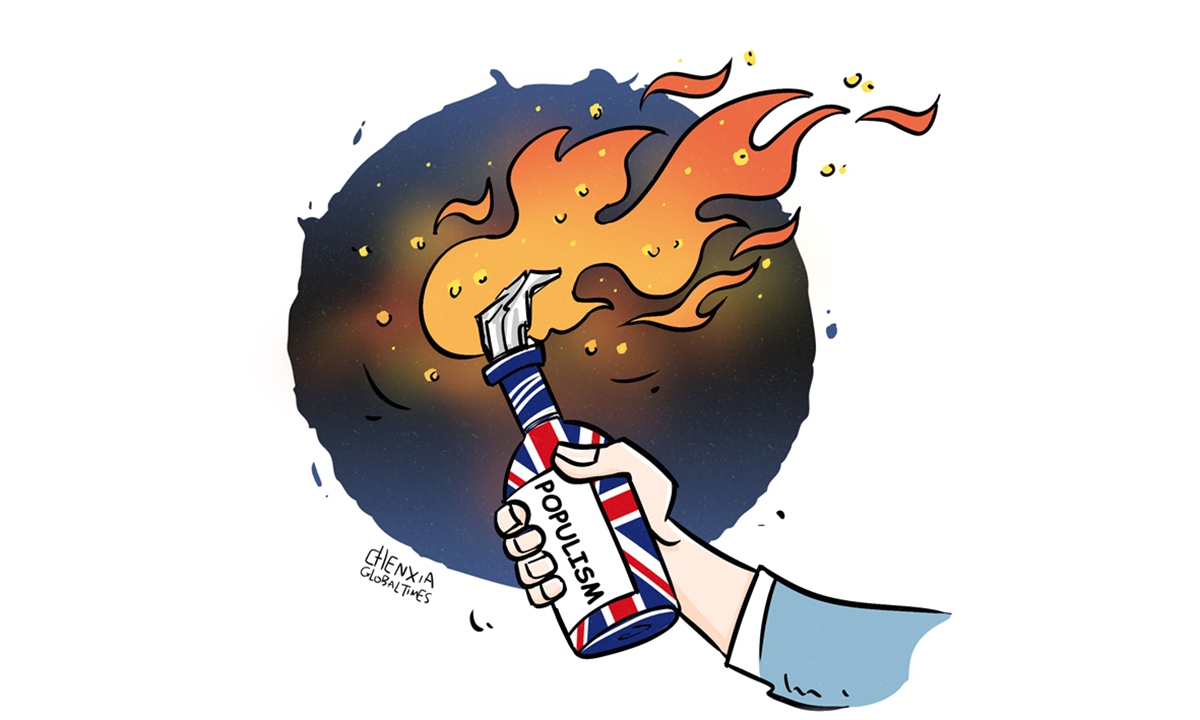
Illustration: Chen Xia/GT
In the digital age, social media has become the main channel for information dissemination, but at the same time, it is gradually exposing various inherent flaws. These flaws not only play a role in fueling international conflicts, but in some cases, they have even become the direct cause of social unrest. The recent large-scale riots in the UK serve as a reminder that it is crucial to regulate the content on social media.
The violent riots in the UK began with a knife attack, but quickly escalated into violent conflicts in multiple areas. What is disturbing is that the spread of the riots is closely linked to disinformation on social media. Far-right groups use social media to quickly spread hate speech and disinformation, adding fuel to social unrest.
In the case of the UK riots, the radical rhetoric of religious extremism and the xenophobic sentiments of the far right are intertwined on social media, further exacerbating social divisions. This interaction was not only manifested in online speeches, but also translated into real actions. It demonstrates that social media in the West is not only a tool for the dissemination of extremist ideas, but also a platform for putting these ideas into action.
This is not an isolated phenomenon. From the US Capitol riot to protests across the globe, rumors and disinformation spread on social media often become important drivers of social unrest. Information on social media is often spread without verification, and the platforms' review mechanism appears weak or ineffective.
These cases actually reflect three major traps in the internal mechanisms of Western social media: the "political neutrality" trap, the "platform immunity" trap, and the "global dissemination" trap. In addition to these three traps, another trap worth noting is the "political correctness immunity" trap. In Western society, entrenched political correctness has permeated public policymaking and implementation. This politically correct approach actually provides fertile ground for the rise and incitement of extreme populism. Therefore, the UK riots are not just a problem of social media, but also a result of long-standing internal conflicts within Western society.
In managing such conflicts, Western politicians and relevant authorities shirk responsibility, prioritizing their own political interests over solutions. The ultimate result is that society bears all the costs while the elites remain in safe places, taking neither action nor responsibility. This is a key underlying cause of the continuous deterioration of these issues in the West. In the face of these inherent flaws, whether or not Western social media can make the much needed changes has become a focus of public concern. However, based on the current situation, it appears that Western social media's efforts against disinformation still seem insufficient.
In today's era of globalization, social media has emerged as a crucial channel for information dissemination, wielding significant influence. However, without effective governance, these platforms can also become catalysts for social unrest. Recent riots in the UK are a stark alarm: Western social media urgently needs to make substantive changes in content moderation and accountability, for only then can fairness and justice in information dissemination be truly achieved.
However, it must be noted that Western society's reflection on the UK riots is marred by obvious bias, excessively focusing on the role of social media. This one-sided reflection reveals a lack of willingness and ability to delve into the underlying motivation behind the riots. The dissatisfaction of society, the spread of extremist ideologies and the inaction of the government are the root causes of the riots.
For countries like China, the riots in the UK offer an important lesson. Effectively regulating social media to prevent the dissemination of disinformation has become a global challenge. In this regard, China can learn from the experiences and lessons of other countries to develop a more robust social media management framework, ensuring the security and accountability of information dissemination.
Social media has already proved itself as a double-edged sword in front of the world. On the one hand, it provides a platform for the free flow of information. On the other hand, it fuels the spread of disinformation and extremist ideologies. However, merely blaming social media or simply deleting extremist content will not address the root problem. Western societies need to engage in deep reflection and undertake substantial reforms to genuinely alleviate the fundamental causes of social unrest. If they don't, it is afraid that events like the UK riots will become a recurring new normal for Western societies.
The author is director of the Research Center of Cyberspace Governance, Fudan University. opinion@globaltimes.com.cn




